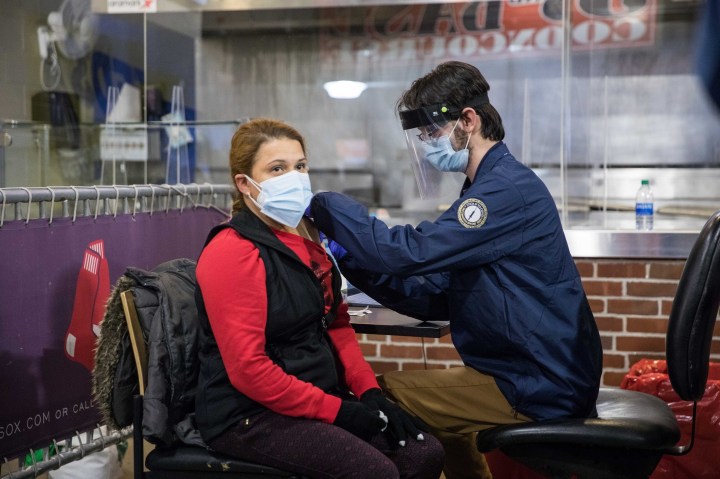
Are pharmaceutical companies the wrong messenger when it comes to a fourth COVID shot?
Share Now on:
Are pharmaceutical companies the wrong messenger when it comes to a fourth COVID shot?

Pfizer and BioNTech, as well as Moderna, have asked the U.S. Food and Drug Administration to authorize a second booster shot of their respective COVID-19 vaccines.
But while Pfizer is asking the FDA to authorize a second booster for just seniors at this point in time, Moderna wants approval for all adults.
Pfizer’s application to the FDA is based on data from Israel, where a second booster has already been authorized. Pfizer said an analysis of health records found that those who were boosted a second time, at least four months after their first booster, showed that the rates of confirmed infections were two times lower while the rates of severe illness were four times lower compared to those who only received one booster. In an interview on CBS News’ “Face the Nation,” Pfizer CEO Albert Bourla said he thinks a second booster will be “necessary.”
The news, coming from the CEO of a major pharmaceutical company, was met with some criticism.
Almost half of all Americans who are eligible for a booster have yet to receive their first booster dose, underscoring the challenges that health agencies may face when making another recommendation for a booster shot. Some health experts say communication about the COVID-19 vaccination and subsequent boosters has lacked clarity.
The Centers for Disease Control and Prevention should be “the foremost authority who is telling the American public what recommendations they have,” said A. Susana Ramírez, an associate professor of health communication at the University of California, Merced.
Other government agencies are also considering providing information directly to the public. The Washington Post reported that the FDA plans to hold a meeting on whether it should hold a campaign “to encourage some or all adults to get additional boosters” during the fall, when it would align with the annual flu shot.
Heather Gehlert, the head of digital communications at the Berkeley Media Studies Group, said pharmaceutical giants like Pfizer may not be the best messenger for a task like this.
“A lot of people who are prone to believing conspiracy theories are highly skeptical of big companies like Pfizer,” said Gehlert, a cancer fighter who’s already gotten a fourth shot. “No matter the message, we have to hear it from trusted local voices who look and sound like the communities they are speaking to.”
A survey from the Kaiser Family Foundation in late 2020 found that patients’ own doctors or health care providers are the most trusted source for receiving reliable information about a COVID-19 vaccine. Eighty-five percent trust them, while 53% trust pharmaceutical companies.
“The financial motivations of pharmaceutical companies have also been raised as a potential barrier to gaining the public’s trust in a COVID-19 vaccine,” KFF reported.
Pfizer has seen $36.7 billion in sales from the COVID-19 vaccine. Moderna’s COVID-19 vaccine pulled in $17.7 billion in sales, while Johnson & Johnson’s raked in $2.39 billion. Pfizer said its profit margin for its vaccine sales is in the high 20% range, which translates to profits approaching $11 billion.
“The way Pfizer and Moderna have priced their vaccines, they are profiting from it. It’s a huge profit. But it is significantly lower than what we would see from typical vaccine pricing,” said Damien Conover, Damien Conover, the director of health care equity research and equity strategy at the firm Morningstar.
Conover said he expects the COVID-19 vaccine market, post-2023, to pull in roughly $6 billion a year, with vaccines “largely needed for elderly folks, immunocompromised individuals, and, eventually, young kids who haven’t had the dosing.”
At this current point in the pandemic, when we’re communicating information about the COVID-19 vaccine, we have to deal with distinct populations, pointed out Ramírez.
She said that while some who have already received their first booster shot may be resistant because they are fatigued or experienced some side effects, this is by and large a group that’s “already aware of the protection that’s conferred by vaccines.” The Centers for Disease Control and Prevention says some people may have side effects, such as sore arms and chills, “which are normal signs that their body is building protection.”
For this group, Ramírez said, they should receive consistent messaging about the vaccine, who is eligible and when they’ll be eligible.
“But from a population health perspective, we need to remember that we still have an enormous number of people who remain unvaccinated or who haven’t even obtained their first booster,” Ramírez said.
That includes children under 5 who don’t yet qualify, people who have misgivings (likely due to partisan divides), and those who have received misinformation and disinformation about the vaccine, explained Ramírez.
For some people, not being vaccinated or being boosted a first time isn’t due to any messaging issues.
Ramírez said the country needs to dismantle the hurdles in the way of higher vaccination rates by, for example, figuring out how to grant people paid time off to get the vaccine to deal with any potential side effects.
“So these are structural barriers that don’t really have anything to do with communication,” Ramírez said.
There’s a lot happening in the world. Through it all, Marketplace is here for you.
You rely on Marketplace to break down the world’s events and tell you how it affects you in a fact-based, approachable way. We rely on your financial support to keep making that possible.
Your donation today powers the independent journalism that you rely on. For just $5/month, you can help sustain Marketplace so we can keep reporting on the things that matter to you.


















